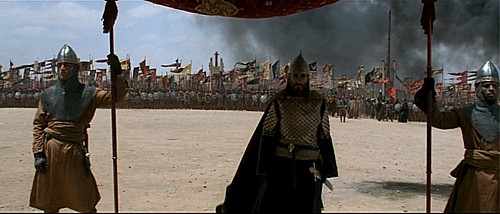
Kingdom of Heaven, Director’s Cut
Seth Williams
The 2005, Ridley Scott film, Kingdom of Heaven is a diamond in the rough, which is strange because its dramatic narrative, written by William Monahan, is nothing short of intriguing. Its characters are unconventional and well-developed. The film’s narrative is helmed by a blacksmith-turned-knight named Balian de Ibelin (played by Orlando Bloom), who is an interesting character. Balian is a passive protagonist who is forced to be an active one. The film takes place during the crusades, and Balian is thrown right in the middle of a religious war for the Kingdom of Jerusalem.
The cinematography, editing, score and production design in Kingdom of Heaven are nothing short of immaculate. The film is a true testament to the power of film as a storytelling tool. It is investigative, discerning, brutal yet delicate while remaining sincere within its political analysis. It includes an all-star cast and a director at the prime of his directorial ambition. All of these things define Kingdom of Heaven…or at least the Director’s cut.
The way you cut your film says it all. A film can have a great script, a wonderfully talented director and a great cast, but it can so easily fall apart during the editing process. The way a film is cut determines the story and overarching mythology and perspective that the film should offer. The amazing thing about the director’s cut is it does not choose sides but portrays both Christians and Muslims as protagonists and antagonists. Wherein this can be very delicate territory, the film does a great job of imploring motivations for both sides.
Balian is given and interesting character arc among this historical backdrop. He gives up. Not in a sense of losing but one of leaving. Balian as a character grows immensely throughout the film, even though he ends up just where he started. Balian is given his charge in a beautifully composed line given by his father Godfrey de Ibelin (played by Liam Neeson):
Be without fear in the face of your enemies. Be brave and upright that God may love thee. Speak the truth always, even if it leads to your death. Safeguard the helpless and do no wrong. That is your oath.
Balian, although not a perfect knight, keeps this oath to his greatest power. His passivity influences his choices as an activist and in this he saves thousands of lives. This is something that is incredibly understated in the theatrical cut of the film.
Upon initial release, the film was panned by critics and audiences alike. It was described as shallow and narratively unsound. People shamed its seeming-political bias and lackluster character arcs. To an extent, these things are true of the theatrical cut. The reasons for these accusations lie within the editing of the film. Director Ridley Scott’s initial and intended cut of the film was 194 minutes long. The studio head at 20th Century Fox took this runtime and cut almost an entire hour out of the film.
They thought no one would want to see a three-hour long drama about religious conflict. (Film Radar)
Then Fox marketed the film as an action, adventure-themed story with a hint of dramatic romance. The film was produced for $130,000,000, and the theatrical version of the film made a disappointing $47,398,413 at the domestic box office.
I was fourteen when I found the theatrical cut of this film sitting in a bin at the Pickens flea market. It was only a dollar and violent action/adventure films were definitely at the top of my list. Little did I know that I would become infatuated with this film. Little did I know that it would affect my personal mythology and my career path. Ever since viewing Ridley Scott’s Kingdom of Heaven, I have had a passion to direct an epic sword and sandals film such as this. I loved this movie for its spectacle.
Only upon recent viewings have I noticed Kingdom of Heaven‘s storytelling flaws. The theatrical cut is lacking in many areas where the director’s cut shines. Editing is a quintessential part of film making because the way you tell your story means everything and makes all the difference. If you get the chance to watch this awesome film, please watch Scott’s Director’s cut!